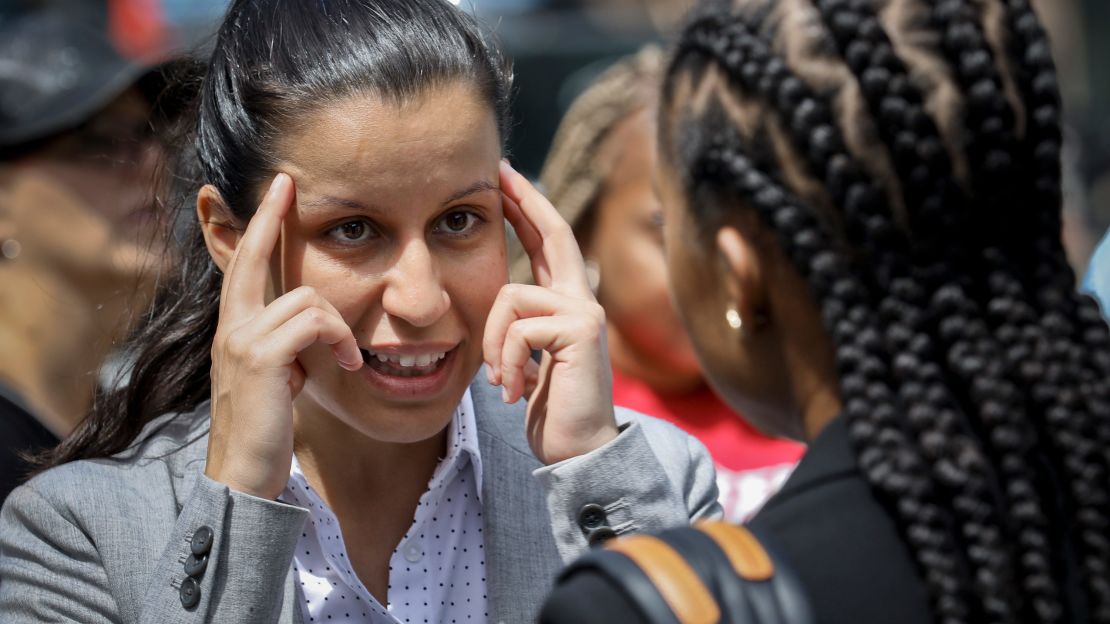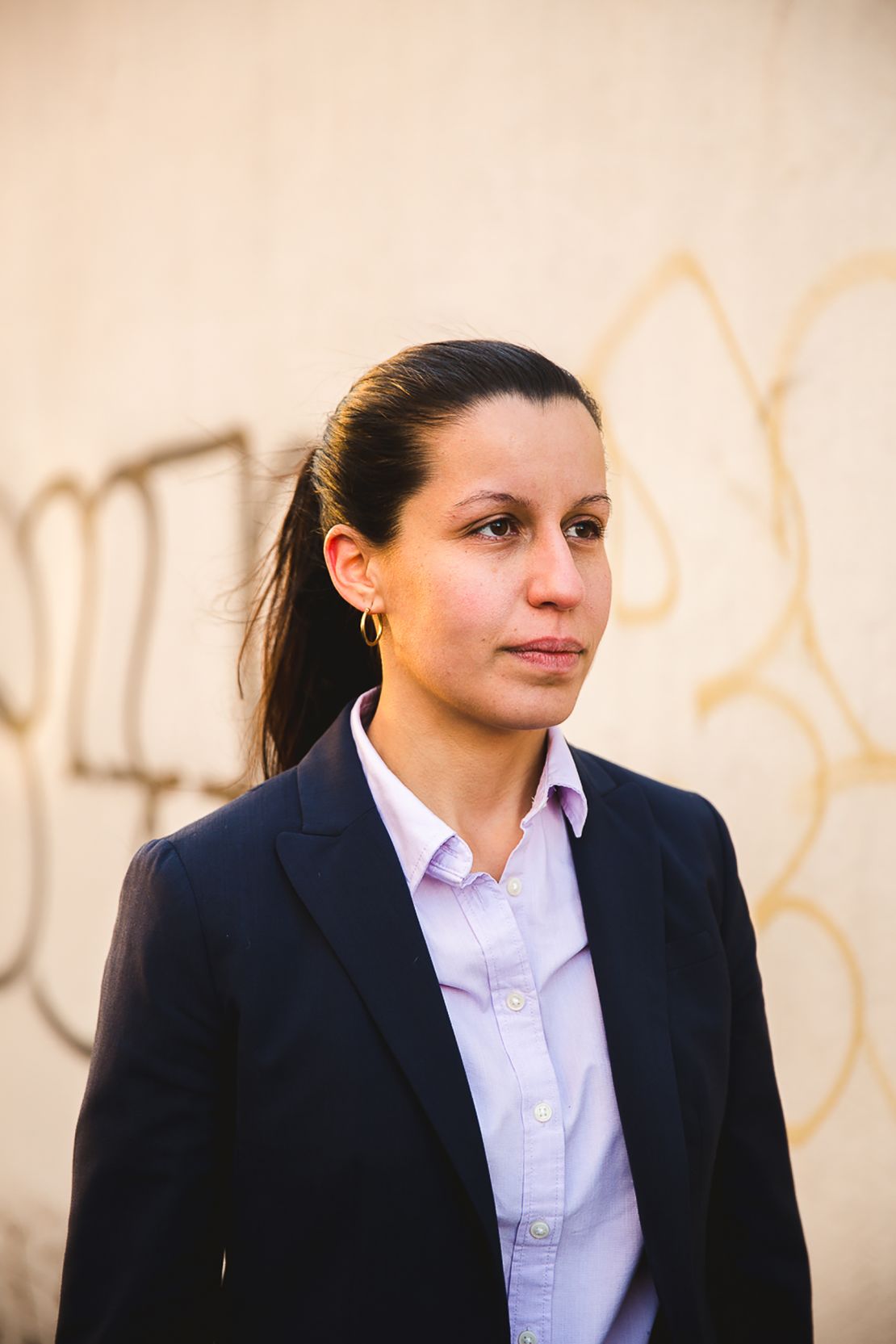The fight over the future of progressive politics in the era of Donald Trump will take center stage on Tuesday in New York’s Queens county, home to 2.3 million people and a captivating intraparty contest that could have implications for Democrats around the country.
Almost a year after Rep. Alexandria Ocasio-Cortez unseated the fourth-ranking Democrat in Congress in a stunning primary upset, 31-year-old Tiffany Cabán, a Latina former public defender of Puerto Rican descent who identifies as queer, is seeking to make her own history in a six-candidate race to replace the late, former Queens district attorney Richard Brown. And she’s got some big-name supporters, including Ocasio-Cortez and Sens. Bernie Sanders and Elizabeth Warren.
Victory for Cabán in Tuesday’s primary, in the county that Trump first called home and the Democratic establishment is fighting to keep its grip, would project out well beyond the borough’s borders – further emboldening a growing tide of insurgent progressives around the country.
Candidates like Cabán have won a series of notable victories over the past year. Their success has pushed the Democratic establishment left, a shift reflected in the issues dominating the party’s presidential primary. Cabán is now seeking to join a growing league of progressive, big city prosecutors like Philadelphia District Attorney Larry Krasner and Boston’s Rachael Rollins, both of whom have endorsed her, dedicated to reimagining the job amid a mass incarceration crisis.
Cabán’s platform represents more than a departure from the “tough on crime” policies that have fallen out favor with liberals around the country. It pushes much further, which is part of the reason the left’s favorite presidential candidates, Sanders and Warren, endorsed her this past week and the Democratic Socialists of America and Working Families Party backed her early on.
The progressive all-star alliance, coupled with the support of the New York Times’ editorial page and new state lawmakers like Jessica Ramos and Julia Salazar, has only added to the national implications of a race many, including Cabán herself, could have hardly dreamed of even a few months ago.
“The common ground that exists between us is just an utter, unapologetic, unwavering commitment to center the experiences and needs of our communities and absolutely nobody else,” Cabán said in an interview last week. “And just not caring about anything else, not caring about who you’re going to piss off, whose feathers you’re gonna ruffle. If we’re going to say ‘the next,’ then I’m looking forward to ‘the next’ and ‘the next’ and ‘the next.’”
A much bigger audience – and challenge for progressives

But as Cabán and her allies readily concede, and her opponents are quick to note, the parallels between this primary and the one that saw Ocasio-Cortez outhustle and, ultimately, handily defeat Joe Crowley, then the chair of the powerful Queens Democratic Party, only run so far.
The frontrunner in the race, Queens Borough President Melinda Katz, present a much different challenge to the one Ocasio-Cortez faced. Katz lives – full-time – in Forest Hills, her hometown Queens neighborhood. Like Crowley, she is a largely popular figure with the backing of the county party, but her campaign is also more closely tied in to what is a much larger electorate that Ocasio-Cortez had to win over and turn out. In many ways, Cabán is climbing a steeper hill, even as her vision drove the campaign’s debate.
Cabán has sharpened her ideas over seven years defending clients against a system she now hopes to take a part in radically remaking. That means declining to prosecute subway fare beaters, recreational drug-related crimes, resisting arrest charges (especially when they are not attached to more serious allegations), loitering, and among many others, sex work. Cash bail would, Cabán promises, be wiped out entirely and her long-term goal is to achieve a “population zero” in the city’s prisons.
During a recent debate, a co-moderator ticked off an abridged list of her plans and asked the assembled field of candidates, “Who disagrees with any of those?”
“I think I agree with most of that list, I think I agree with all of it,” Katz said, calling minor marijuana arrests “an excuse for stop-and-frisk,” the controversial policy struck down in court and nearly done away with by New York Mayor Bill de Blasio’s administration.
Katz’s argument against Cabán, one she pressed repeatedly throughout the debate, was less focused on policy than experience – she’s got it, Katz says, and Cabán doesn’t. And without a record of leading any major public office, Katz said, Cabán will be hard-pressed to realize her promised overhaul of the massive bureaucracy.
But the primary will likely come down as much to policy as the candidates’ personal histories and political styles. Katz has worked within the system for decades. Her young rival emerged from law school, after being the first in her family to graduate from college, and made a decision to work against it.
Cabán’s pitch today echoes the line Massachusetts Rep. Ayanna Pressley made famous during her run last year, when she said, “The people closest to the pain should be closest to the power.”
“There’s not much that separates me from my clients,” Cabán told CNN, “in terms of these trauma cycles and what’s modeled for me, but for the fact that my dad got a union gig and that meant I got access to stabilizing services and supports. I got access to therapy to have reparative experiences and break cycles and engage in healthier practices.”
Asked how she planned to change the nature of a Queens district attorney’s office that has for nearly three decades operated almost completely in opposition to her ideals, Cabán was blunt.
“There’s going to be three types of folks in that office,” she said. First were those who jump at the chance to implement guidelines and practices designed to keep people in their communities and out of the carceral system. Another, she said, will be “resistant to change,” but come around.
As for the third? “They are not going to be around.”
When her platform was put up before what looked like a jury of fellow candidates during that recent debate, Cabán briefly defended it, then sought to turn the question on its head.
“What we have done historically is thrown black and brown people in jail for jumping turnstiles, for having small amounts of marijuana,” she said. “But when your landlord turns off your heat in the middle of the winter, nothing happens.” Last Tuesday, one week out from the primary, Cabán held a small rally in Jackson Heights, a dazzlingly diverse neighborhood in northwestern Queens. Among those introducing Cabán was Ana Maria Archila, the co-executive director of the progressive Center for Popular Democracy and a Queens resident.
To most Americans, though, Archila isn’t known for her years of activist work. She is, instead, one of the two women who confronted former Arizona Republican Sen. Jeff Flake in an elevator on Capitol Hill during the fight over now Supreme Court Justice Brett Kavanaugh’s confirmation. On Tuesday, as Cabán finished her brief remarks and a mist drifted through the plaza, Archila connected her young ally’s political campaign to that run-in with the erstwhile senator.
“When I think about what was powerful about the confrontation with Flake, it was the emotional demand, it was saying, ‘Look at me, don’t look away. Actually engage with my life or accept that you don’t understand it and cannot represent it well,’ ” Archila said. “That’s the thing that Cabán is speaking to.”
A national debate meets local questions

The lessons of Crowley’s loss weren’t lost on the beaten-up Queens Democratic party machine. Katz has more engaged labor backing and the support of a long slate of local public officials and leaders. The campaign has seen its share of salty exchanges but the ill will on the left is less pointedly directed at Katz, a liberal career politician (but for a stint as a real estate lobbyist between offices) than the party establishment supporting her.
Perhaps the most powerful figure among them is New York Democratic US Rep. Gregory Meeks. He is the new chairman of the county party, its first African American leader after being elected in March to replace Crowley, who resigned to take a lobbying job. When Sanders and Warren announced their endorsements earlier this week, Meeks struck out with a rejoinder that might have echoed out well beyond Queens and New York.
“I saw today that Bernie Sanders and Elizabeth Warren have decided to get involved in the DA race in Queens County. I don’t know who they spoke with, but clearly they did not speak with the Elected Officials of Queens County, or the people who elected them,” Meeks said in a statement, listing a number of high profile African American officials to endorse Katz.
Warren and Sanders have been outspoken proponents of changes to the criminal justice system and pushed for action to end mass incarceration. In statements to the Washington Post this week, after their endorsements landed, they signaled an openness to decriminalizing sex work.
Still, Meeks’ anger over what he cast as the interference of uninvited guests exposed fault lines within the Democratic Party, the kind that run especially deep across a racial barrier that many progressives and leftists have struggled to cross.
To leading New York progressives like those inside the Working Families Party, who have come together with allied community groups to help organize and boost funding for Cabán, those questions – and challenges – are never far from the surface.
The night before Sanders and Warren weighed in, and Meeks fired back, Bill Lipton, the state director of the Working Families Party, spoke – cautiously – about the current and future faces of the progressive movement in New York.
“There is a new generation of Latina leaders who are knitting together people of color and progressive whites in an impressive coalition,” he told CNN, also pointing to New York City Public Advocate Jumaane Williams, who ran for lieutenant governor in last year’s Democratic primary with WFP-backing before winning his current position.
Williams is African American and, now, a potential favorite in the next mayoral race. He defended Cabán against a misleading attack ad launched by the Katz campaign on Saturday, but he has not endorsed her – or anyone else – in Queens.
UPDATE: This story has been updated to reflect that Caban identifies as queer.

